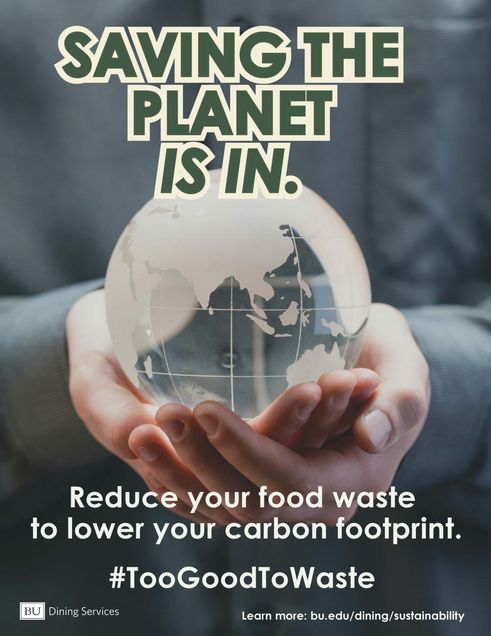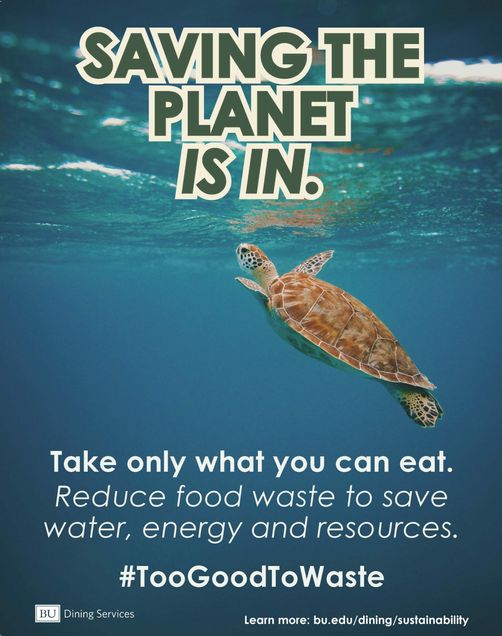BU Dining Services was involved in the development of the University’s Zero Waste Plan. We are actively developing new initiatives and taking steps to reduce waste to help achieve Zero Waste by 2030.
What Happens to BU’s Food Waste?
Find out with BU Today!
Food Waste
We are actively working to reduce food waste on campus, both pre-consumer food waste – food waste generated before food is served – and post-consumer food waste – food waste from people’s plates. In order to be successful, we need the entire BU community’s engagement and support.
Every day, we take steps to minimize the amount of pre-consumer waste we generate in our kitchens, such adjusting production volumes, cooking to order and in small batches, repurposing leftover ingredients, and retraining knife skills. We use a sophisticated technology called Leanpath to identify and reduce pre-consumer food waste in all dining halls, as well as in the George Sherman Union kitchen for the GSU Food Hall and Catering on the Charles. Real-time data identifies the amount and type of food wasted, as well as the reason for the waste. With this information, BU Dining strategically implements changes to trim food better, utilize food in new recipes, and customize the amount of food prepared for each meal. Pre-consumer waste can include trim waste, overproduction, expired food, spoiled food, and food wasted because of quality, equipment failure, handling, or catering guarantees. About 75% of pre-consumer food waste is inedible trim from produce and meat. Whenever possible, we recover surplus food for donation. We work with three local partners: Food For Free, Rosie’s Place, and BU’s Student Food Rescue program. Between July, 2021 and June, 2022, we donated nearly 8,500lbs of food from our residential dining halls, retail locations, and catering operations. Through waste tracking we know that post-consumer waste accounts for about 75% of food waste. BU Dining Zero Waste Guides lead ‘Weigh the Waste’ events in each dining hall throughout the semester. These events not only serve as an opportunity to highlight the collective amount of post-consumer waste generated on campus, but also provide us with valuable information on what foods are being wasted and why so we can implement changes to support waste reduction. Some of the changes we have implemented as a result of these events include: plating every other burger without a bun, offering smaller slices of pizza, removing the default starch from some entrees, and offering lettuce wraps. Over the course of 18 events in the Spring 2024 semester, the average student generated about 1.5oz of food waste per meal. Since we began holding Weigh the Waste events, we have seen a 50%+ reduction in average edible food waste per person. New this year, we are piloting an AI plate waste camera on one of the dish returns at Marciano Commons. This technology will allow us to better understand the types of foods that are commonly wasted, as well as provide an estimate of the quantity of plate waste generated, so we can implement changes to help minimize plate waste.Pre-Consumer Waste
Post-Consumer Waste




Non-Food Waste
Whenever possible, we try to use single-use materials that can either be diverted from the trash stream (i.e. aluminum cans, fiber containers, unbleached napkins) or are made of plant-based materials. We do not use Styrofoam food packaging or plastic straws in our operations.
Boston University has decided to remove plant-based plastics from the food waste stream on campus. While these items are plant-based, they take significantly longer to break down than food and fiber-based products and pose challenges for our waste haulers. Please place used plant-based plastic cups, lids, utensils, and containers in trash receptacles. When food waste collection is available, empty leftover food into the food waste bin before throwing away plant-based plastic.
Some of our initiatives to reduce single-use waste include:
- Choose to Reuse reusable to-go container program
- Starbucks BYO rewards program – place your order in Grubhub and request to use your own mug
- Simply provide the mug to the barista at the pickup counter and they will pour your beverage into it
- To incentivize participation, each time you receive an order in your BYO mug, we’ll stamp a rewards card; after eight stamps you can get a free Grande beverage
- BYO reusable mug discount for in person orders at retail locations and reusable mugs to borrow at Questrom Starbucks
- Exclusively using reusable dishware in the dining halls, and providing the option for reusable dishware at the GSU
- Offering paper straws by request
- Making cutlery and paper bags optional in Grubhub at locations like the GSU
Waste Streams
Food Waste
Massachusetts is one of eight states in the country with a waste ban on organic material (food waste). Since 2014, any businesses, institution, or organization in Massachusetts that generates more than one ton of food waste each week is required to divert the waste from the trash.
Food waste from Marciano Commons, Bay State Underground, and the GSU goes to the Centralized Organic Recycling (CORe) facility in Charlestown, MA, where it is broken down into a slurry and then anaerobically digested at the Greater Lawrence Sanitary District in North Andover, MA. This process produces energy and fertilizer pellets.
Food waste from all other locations goes to Hidden Acres Farm in Medway, MA where it is composted via windrow composting.
Cooking oil is recycled into biofuel.
Recycling
Recycling is the most complex of the waste streams we utilize, especially because there is so much variation in what can be recycled depending on where you are in the world. Massachusetts has standardized statewide guidance and resources available through Recycle Smart MA; you can search the Recyclopedia to learn if a product can be recycled and take a short quiz to test your knowledge.
At BU, all of our recyclables are sorted at Casella’s Materials Recovery Facility in Boston.
Trash
Trash is sent to a variety of locations, including the waste to energy incinerator in Saugus, MA. The ash generated from incineration is then landfilled.
Questions? Contact Lexie Raczka, Sustainability Director for Dining Services
